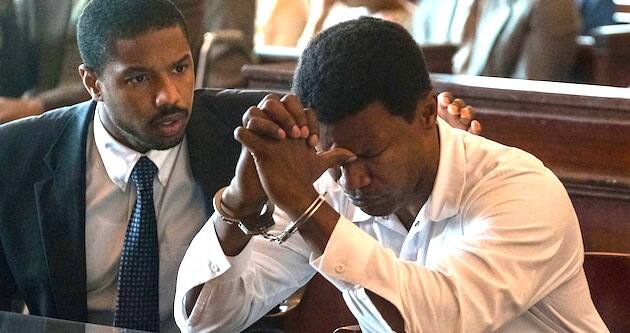MOVIE REVIEW: ‘Just Mercy’ and the pursuit of real justice

Just Mercy is based on a book of the same name written by the Bryan Stevenson, a legal advocate who’s spent the better part of three decades crusading for the rights and better legal representation for those convicted of crimes in the South, especially those on death row. The movie, which premiered in December 2019, was released to DVD and streaming June 4. And the timing couldn’t be more perfect.
With strong performances by Michael B. Jordan (Bryan) and Jamie Foxx (Johnny D), Brie Larson (Eva Ansley) and Karon Kendrick as Minnie, Just Mercy begins deep in Alabama, just a 90-minute drive north from Mobile. That’s where you’ll find the small town of Monroeville, home of To Kill a Mockingbird author Harper Lee.
The folks of Monroeville, circa 1991, are proud of their literary heritage. Ask anyone, and they’ll point you to the To Kill a Mockingbird museum down the way. Or to the courthouse, where Lee had Atticus Finch make his fabled defense of a black man falsely accused of rape. It’s a civil rights landmark, they’ll tell you.
Perhaps a few—too few—would see a sad irony, too.
Walter McMillian, better known as Johnny D, is on death row. The black man was convicted of killing a white woman named Ronda Morrison: Prosecutors said that he walked into a laundromat on Nov. 1, 1986, and shot her several times in the back. In a trial that took just a day and a half, he was tried and convicted by an almost all-white jury, which recommended life in prison. Not harsh enough, the judge decided, and slapped Johnny D with the death penalty.
READ: Christian movies streaming now
Never mind that the crime’s main witness was a convicted felon himself who had plenty of reason to frame McMillian. Never mind the lack of motive or physical evidence. Never mind that a score of witnesses said he was at a fish fry when the crime took place. (The fact that those witnesses were black, apparently, made their testimony unwanted.)
Enter Bryan Stevenson, a graduate of Harvard Law School who rejected a position at a posh law firm to head a non-profit legal team called the Equal Justice Initiative—an organization that gives convicted felons (particularly those on death row) the sort of legal help that might’ve escaped them the first time around. He looks into McMillian’s case and finds all sorts of inconsistencies—so many, in fact, that he wonders whether anyone read the evidence at all. If anyone deserves a second chance at justice, it’s McMillian.
But Monroeville’s power brokers don’t want to hear it. They got their man, never mind the evidence. They knew McMillian was guilty just by looking at him. And if Ronda Morrison’s spirit doesn’t rest easy, her parents sure do.
Maybe if Stevenson had looked more like Atticus Finch—a white man born and bred in the south, a man who knew everyone from the mayor and sheriff to the lady serving coffee at the corner diner—Monroeville’s power brokers might’ve listened to him.
But Stevenson’s a Delaware-born, East-coast educated black man. And Sheriff Tate and D.A. Tommy Champan don’t take kindly to carpet-bagging northerners telling them how to run their town.
Stevenson looks like a candidate for sainthood. We hear hints of his childhood, how he grew up poor, in a neighborhood not so different from McMillian’s own; and we see how his desire to help people on death row first germinated. When he leaves for Alabama, Bryan tells his nervous mother that she “always taught me to fight for the people need it the most.”
Eva Ansley, who works closely with Bryan, notes that unlike most lawyers, Bryan gets close to his clients—so much so that they become nearly family to him. And when one of those clients is sent to the electric chair in spite of Bryan’s help, the condemned man thinks so highly of Bryan that he has the Army (from which he was honorably discharged) send the flag he earned to the lawyer.
While “Johnny D” McMillian is no saint (as we’ll see), he becomes a strong, faithful friend to many fellow death-row prisoners. When one suffers a panic attack after getting an execution date, Johnny D walks him through calming breathing and visualization exercises. “Whatever you did,” Johnny tells the man, “Your life is still meaningful.” And when that man is led to the execution chamber, Johnny D leads a noisy salute to the condemned. He’s deeply saddened by how he hurt his family, too, and wants to do whatever he can to make amends. And sometimes, when the case against him seems to hit a wall, Johnny D encourages Bryan, rather than the other way around.
While Just Mercy isn’t technically a Christian movie, faith’s fingerprints are everywhere here.
Bryan, it’s suggested, is a Christian: He bonds with a death-row inmate over how both of them grew up in church. (Bryan played the piano there, while the convict sang in the church choir.) And when the guard roughs up the convict and forces him out of the room, the prisoner begins to sing an old hymn with a smile. Later, Bryan participates in a worship ceremony at a Monroeville church—watching and singing along as fellow congregants enthusiastically praise God.
A convict is led to the electric chair as the gospel song “Old Rugged Cross” plays in the background. The movie seems to suggest thin parallels between the man’s execution and Jesus’ own unjustified death: The condemned man looks compassionately at one of the jail guards fastening his leg to the chair, and when he asks whether he has any last words to give, he simply says that he harbors “no ill will” to anyone. The man’s gentleness, combined with the horrific way he dies, deeply impacts the guard—much as Jesus’ own forgiveness from the cross is sometimes shown to impact the Roman soldiers who took part in the execution.
As mentioned, Johnny D was actually attending a fish fry during the murder he was accused of committing—a fundraiser, we’re told, for the church he attended. The spiritual “Lay Down My Life for the Lord” plays as the credits roll. We see plenty of churches and crosses in the background of various scenes.
Some might be inclined, I suppose, to see a political bent in Stevenson’s work. And some might be discomfited by the movie’s depiction of southern Alabama in the not-so-distant past. I have relatives who live in Alabama, and I’d like to think that some progress—difficult and halting progress, perhaps, but progress nevertheless—has been made since then.
But if history teaches us anything, evil—and no doubt, racism is one of the planet’s most pernicious evils—does not disappear naturally with time. It takes work and courage and risk and pain to address it. Oh, and faith, too.
Just Mercy is a beautiful example of the work, the courage and the faith it takes to push against the wrongs of this world: faith that a broken system can still be repaired enough to yield a semblance of justice. Faith that good people can stand up for a good reason. Faith in God, too, whose presence we subtly feel throughout the film.
It’s also timely with racial injustice in the news and the recently passed historic First Step Acts – a signature criminal justice and prison sentencing reform bill pushed through Congress by President Donald Trump. It was an issue that wasn’t addressed by previous administrations including that of the first black President, Barack Obama.
Theaters are filled with secular movies that are either indifferent or outright hostile to faith, with only the occasional small, overtly Christian faith-based flick offering counter programming. Just Mercy finds the middle ground, showing how faith can inspire and motivate believers in the real world.
The movie is not without some issues. But those are relatively minor in relation to its redemptive payoff. , Just Mercy is an inspirational, educational and well-acted portrait of the pursuit of true justice.
–Paul Assay | PluggedIn
[Editor’s Note: This story was updated to reflect that Warner Brother’s announcement]





